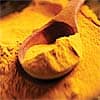- Science & Research
- Science News
- Newsletter
- 2013
- January 25

Newsletter
Newsletter
Review Explores Effects Of Curcumin On Lifespan
Review explores effects of curcumin on lifespan
Friday, January 25, 2013. A review published online on January 17, 2013 in the journal BioFactors documents a benefit for curcumin, a compound that occurs in the spice turmeric, in extending the life of several species. "The prospect that pharmaceutical and nutraceutical interventions may delay aging and age-related diseases is shared by many researchers," write Li-Rong Shen and his associates at the Jean Mayer-USDA Human Nutrition Research Center on Aging at Tufts University in their introduction. "By modulating putative biological processes of aging in mammalian cells and the entire body, specific foods can exert antioxidant activities, mitochondrial stabilization, metal chelating activities, inhibition of apoptosis of vital cells, and induction of cancer cell apoptosis. Thus, specific foods and herbs constitute a great promise to improve health and prevent age-related chronic diseases." The authors discuss experimental investigations of the effects of curcumin or the curcumin metabolite tetrahydrocurcumin (THC) on life span. In a study involving the roundworm C. elegans, growth media containing a low concentration of curcumin increased mean (average) lifespan by 39 percent and maximum lifespan by 21.4 percent. (Maximum lifespan refers to the maximum number of days or years that a species is believed to be capable of surviving. The maximum lifespan of humans is currently agreed upon as 122 years.) The researchers also documented a reduction in reactive oxygen species, decreased lipofuscin levels (indicating less cellular damage during aging) and greater resistance to heat stress in curcumin-treated worms in comparison with untreated controls. In a study with fruit flies, which generally survive an average of 64 days, an increase of mean lifespan to 80 days occurred in curcumin-fed flies. Another study involving two strains of flies found varying effects of curcumin in male and female flies, with females of one strain and males of another strain experiencing an extension in lifespan. A third fly study also revealed a variation in male and female response to curcumin, although the compound was shown to extend life in both genders. The curcumin metabolite tetrahydrocurcumin has also been associated with lifespan extension. In male mice supplemented with THC beginning at the age of 13 months, mean lifespan was increased by an average of 84 days in comparison with unsupplemented mice. Tetrahydrocurcumin was also shown to extend lifespan and reduce oxidative stress in male and female fruit flies; however, research findings from this study suggest that the mechanism involved in lifespan extension may not be related to curcumin's antioxidant activity. "Given the long and established history of turmeric as a spice and herbal medicine, its demonstrated chemopreventive and therapeutic potential, and its pharmacological safety in model systems, curcumin, the bioactive extract of turmeric, promises a great future in human clinical studies designed to prevent and/or delay age-related diseases," the authors conclude. "Extensive, well-controlled clinical trials are now needed to evaluate fully the potential of curcumin in terms of optimal dose, route of administration, and potential interactions with other drugs." | ||||||||||||||||
 | ||||||||||||||||
| ||||||||||||||||
| ||||||||||||||||
 | ||||||||||||||||
| ||||||||||||||||
BioPQQ™ is a trademark of MGC (Japan) | ||||||||||||||||
The latest news on aging, nutrition, and vitamins
Lab
Testing
How Life Extension lab testing works








